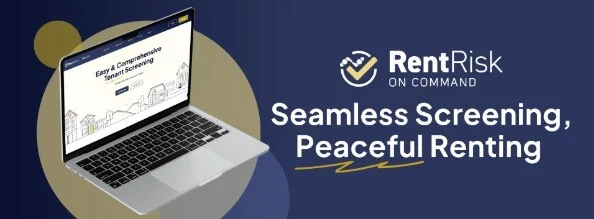Navigating Military Landlord and Tenant Relationships
There’s a lot more behind a military landlord-tenant relationship than simply labeling someone a "good" or "bad" landlord or tenant. Overgeneralizing prevents us from seeing what’s really causing tension, while understanding both perspectives helps us approach issues more logically and less emotionally.
With this in mind, let’s look at both sides of the equation and hear accounts from fellow military landlords and renters to gain a more balanced view.

Understanding Both Sides of the Military Rental Experience
The Landlord's Side: Managing Homes from Miles Away
Military landlords bring significant financial investment and emotional attachment to the table. Many are service members who purchased a home near their duty station, then received PCS orders, and rented it out when they left, whether to earn extra income, ride out a slow market, or return to the property one day.
They’ve chosen to entrust their home, often from hundreds or thousands of miles away, to people they’ve never met. Then there's turnover, which adds another layer: every PCS season may mean running a background check for renters, repairs, showings, and the stress of covering a mortgage while waiting for new renters.
The Tenant's Side: Life in Military Rentals
For military families, renting a home is often the most logical housing solution, especially with short-term orders, uncertain timelines, or less-than-ideal duty locations. Searching for military houses for rent or military rentals by owner offers flexibility and convenience.
Landlords should remember that tenants won’t have the same emotional attachment to the property, but that doesn’t mean they’re careless. Good renters respect the home, report maintenance issues, and leave it in good condition, even if their connection is practical rather than personal.
Stories and Lessons from Military Landlords
For military landlords, managing repairs, relying on property managers, and trusting tenants to care for their homes can be stressful. The following actual stories reveal just how unpredictable the experience can be.
When Maintenance and Management Go Wrong
A military couple revealed that self-managing their rentals became too much. Even after hiring a property manager, they still encountered unexpected issues. One example was a tenant who dragged the dishwasher to the curb, claiming it was broken, instead of calling for maintenance.
While stationed overseas, one family relied on a property management company to oversee their home. After a hurricane caused roof damage, it took months of persistent calls to complete the repairs. The company initially painted over the interior water stains instead of fixing the leak itself.
Screening and Tenant Challenges
In one shocking case, a landlord discovered that their property manager had accepted a fraudulent application. The renter turned out to be harboring a wanted fugitive, leading to a SWAT raid on the home, a worst-case scenario no one ever expects.
Another landlord rented out a home for several years, only to face serious problems with an applicant who had poor credit. The renter fell behind on payments, nearly faced eviction, and left behind thousands of dollars in pet-related damage beyond what the security deposit could cover.
Despite the challenges, many military landlords choose to stay in the game to access the long-term benefits. With reliable tenants, a trustworthy property manager, and some experience, real estate remains one of the most financially rewarding investments.
Stories from Military Renters
Between tight PCS timelines, unfamiliar markets, and renting from afar, military renters often face their own frustrations. Most landlords and property managers try their best, but when issues arise, renters can feel powerless. These stories highlight the challenges (and lessons learned) on the renting side.
When Lack of Landlord Oversight Impacts Tenants
One military family described a situation where their landlord failed to meet HOA standards, and the committee suspended the renters' access to the neighborhood pool, an amenity that influenced this family’s decision to live there.
In another case, a renter moved into a home that the previous tenants had left in poor condition. Weeks later, the new tenant began noticing small things out of place (missing items, lights left on) and eventually caught the former renter using a garage code to access the home and do laundry.
Another family rented from an absentee landlord whose son performed subpar repairs, leaving behind health concerns from dust and debris. The landlord blamed them for issues beyond their control, making it nearly impossible to recover their deposit.
Standing Up to Unfair Charges
For one tenant, simply giving notice to move out triggered hostility from the property owner. The landlord attempted to use the final inspection to unfairly charge them, but because the tenants had thoroughly documented move-in conditions, the property manager ensured the tenants weren’t held responsible for false claims.
Despite the occasional nightmare, renting has its perks: no property taxes, no repair costs, and the flexibility to relocate quickly with new PCS orders.
Tips for Strengthening Your Landlord-Tenant Relationship
So what can we learn from these stories? Whether you’re a landlord or tenant, small proactive steps can prevent big conflicts.
Best Practices for Landlords
- Run a background check for renters. It’s the best way to reduce risk. Whether through your property manager or on your own, set a minimum credit score requirement to ensure financial reliability.
- Hire the right property manager. This person can make or break your experience. Choose one who communicates clearly, carefully vets tenants, and follows through on repairs.
- Ask for documentation. Always request receipts and repair records, whether from tenants or property managers. Transparency protects your investment and ensures the work is done right.
Suggested resources for landlords: RentRisk tenant screening, MilitaryByOwner's property management resource page, and our free Military Landlord Guide.
Best Practices for Tenants
- Request new locks and reset access codes. Protect your privacy and avoid unwanted surprises from previous tenants.
- Document any promises. If your landlord agrees to paint, repair, or replace something before you move in, make sure it’s in the lease.
- Conduct a detailed walkthrough. Document every flaw before moving in. Take photos and notes to protect you from unfair move-out charges.
- Clarify communication. Some landlords want frequent updates; others prefer only urgent calls. Set expectations early.
As you prepare for another PCS move, whether renting out your home or finding your next one, remember that a little understanding goes a long way. A good landlord-tenant relationship isn’t about avoiding problems; it’s about handling them with respect and clear communication. And when frustrations arise, because they will, keep perspective. Most of the time, both sides want the same thing: a well-cared-for home and peace of mind.
Visit MilitaryByOwner to search for military houses for rent and military rentals by owner.






